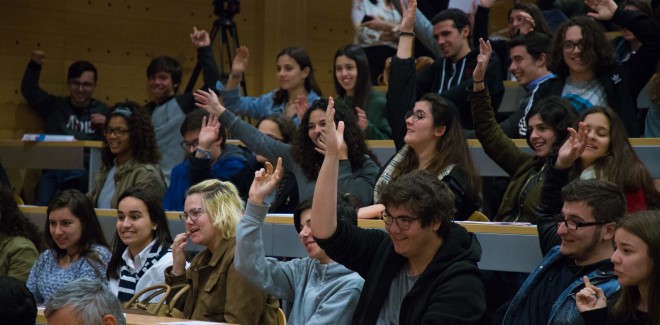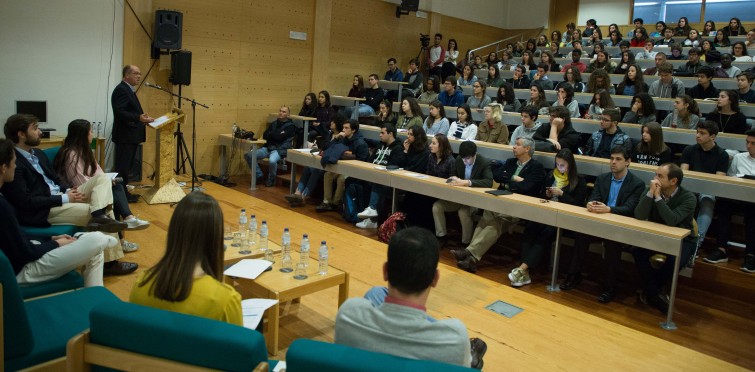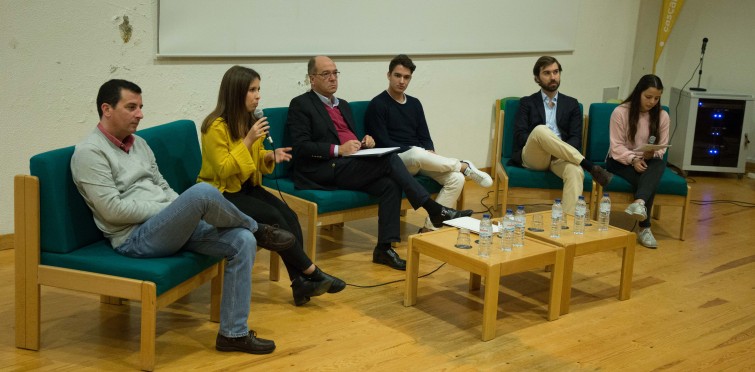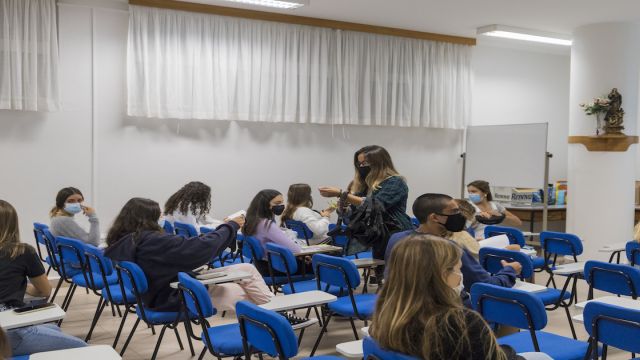
The 2nd Assembly of Public and Private Secondary School Class Delegates, this year under the theme of "Education and Employability", is ongoing, until next Friday, March 23, in the various schools of the county. The students' representatives thus have the opportunity to directly question the Municipal Executive present in the forums on the topics under discussion.
"Young people have always been leading transformative movements throughout history, but for this it is necessary that none of you be accommodated in your comfort zone and participate with acts of active citizenship, with high levels of tolerance, solidarity and especially of requirement ", So Carlos Carreiras addressed the assembly of class delegates. "Never cease to be demanding with your mayor," appealed the mayor.
Maria Madalena Máximo, a spokeswoman for the Colegio Amor de Deus, started the question-and-answer period, starting with the topic of mobility, much debated during the morning: "When is free transportation for all young people?" He asked.
Carlos Carreiras said that mobility is one of the main problems of cities and also in Cascais. He also explained that with the creation of the Municipal Transport Authority, the municipality is thus at the forefront to be able to take a set of measures in this matter. "Road transport in the county is already free for those under 12 years of age, but the tendency is to progressively expand free of charge until the age of 23," said the president.
Patrícia Couto, a spokeswoman for the Carcavelos Primary and Secondary School, launched the topic of employability itself and questioned the Executive about incentives to youth employment in areas other than the Economy (a program that she already attends).
The mayor of Cascais said that Cascais is the first Portuguese municipality to create a department for employability, with a special focus on fostering youth employment. "Young unemployment is worrying in the country, more than double the overall average," said Carlos Carreiras, adding that in Cascais the youth unemployment rate is still lower than the country average: "At present, there are 494 young people to the 24 years enrolled in the job center, talent that is wasting. For this reason, the mayor recalled that "there are a series of municipal programs for attracting employment and talent that is developing in the county."

Mariana Ezequiel, a spokesperson for the Fernando Lopes Graça School, pointed out the need to provide training to school staff, both in life-saving, in computer science and even in the relationship with students. Carlos Carreiras explained that through delegation of powers to the government, more than 500 people entered the city council, so the main concern was the integration of these employees and the hiring of others in default. "Certainly, we will develop training plans, after the approval of the Education Charter that is about to happen and which is a document prepared with the whole community," said Carlos Carreiras.
Pedro Coelho, spokesperson for the Marist College of Carcavelos, once again brought the theme of mobility to the assembly, this time the need for safer bicycle paths and the resolution of the problem of traffic congestion at the door of schools at peak periods.
Councilman Frederico Pinho de Almeida said that a solution to solve this congestion is the lack of school hours so that the entrances and exits were not all concentrated in the same period of the day. But he added that this problem means that young people use more public transportation and change certain behaviors of their own parents who often park cars without any concern for traffic.
But the mayor also acknowledged that this will have to increase traffic circuits and frequencies, and the use of an app that allows smartphones to receive the real-time circuit and career schedules and to other means of transport.
Many other issues were raised by the representatives of the schools, including the excessive workload agreed by the Education Councilor Frederico Pinho de Almeida: "It is not permissible for students to spend more time in school than their parents at work," agreed the councilman, adding that it is "necessary to rethink the workload of school days and give more time to the arts, sport and other extracurricular areas." But, as he acknowledged, "this is a competence of the government and not the municipality." PL


























